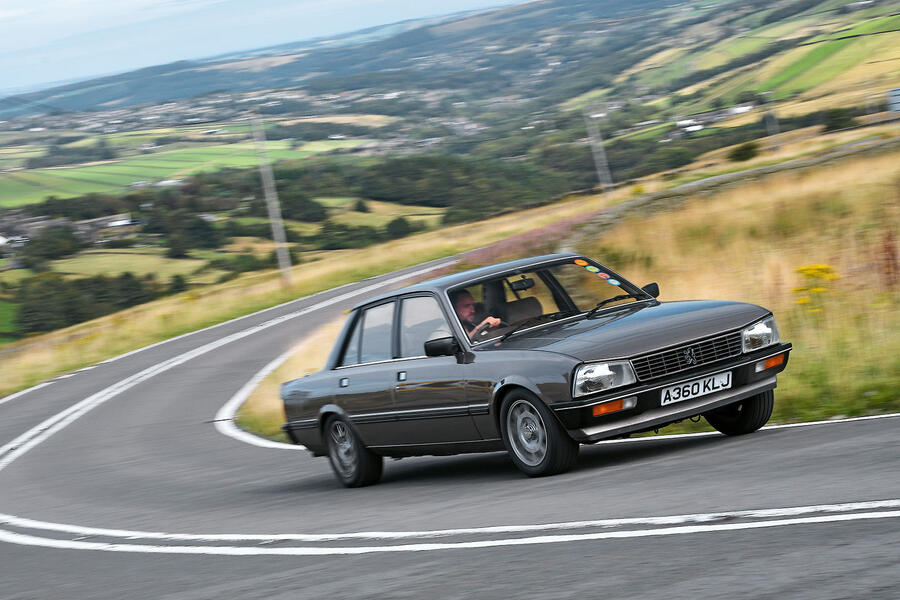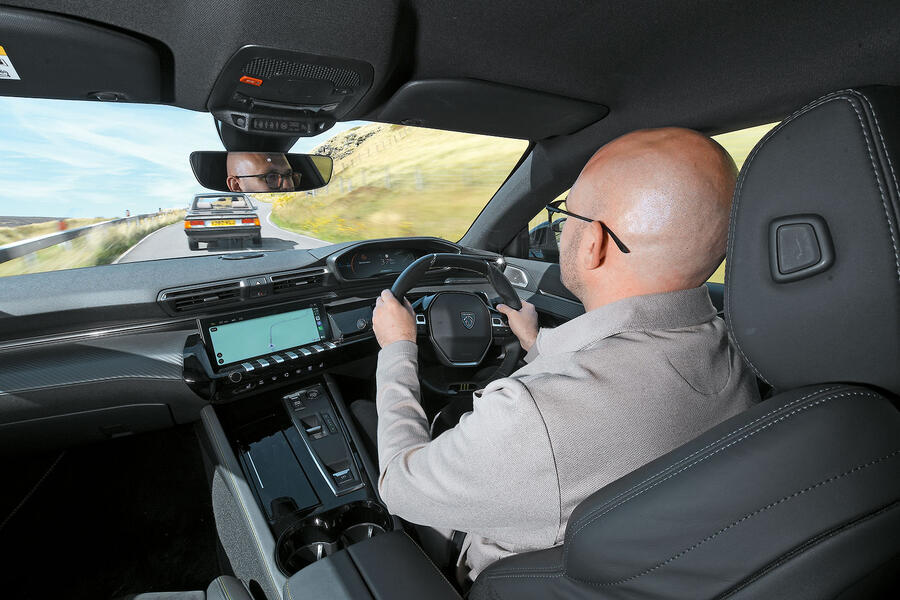Recent Updates
12/06/2025 12:00 AM
Toyota bZ4X
12/05/2025 12:00 AM
Pay-per-mile tax on EVs slammed as 'unreasonable' burden on fleets
12/05/2025 12:00 AM
Want to put the fun back into driving? Get a van
12/04/2025 12:00 PM
How GM's ownership of Lotus went 'appallingly wrong'
12/03/2025 12:00 PM
Kia priming rakish replacement for Stinger saloon
12/03/2025 12:00 AM
Footballers prove young people do like cars
12/03/2025 12:00 AM
JLR axes design boss Gerry McGovern
12/03/2025 12:00 AM
Who will replace McGovern at JLR? Your guess is as good as mine
12/02/2025 12:00 PM
Kia will unveil EV2 in January as Renault 4 rival
12/02/2025 12:00 PM
Ford set to channel Bronco for new PHEV SUV
EV, Hybrid, Hydrogen, Solar & more 21st century mobility!
 Stephen Dobie bids farewell to Peugeot's performance saloon and compares its most significant ancestor
Stephen Dobie bids farewell to Peugeot's performance saloon and compares its most significant ancestor
When was the last time you saw either of these cars? The Peugeot 505 sold over a million but, because of the equally vicious hands of rust and scrappage schemes, scant few still survive on British roads. Even fewer roam freely upon them.
The now six-year old Peugeot 508 PSE won’t score as many I-Spy points, but given Peugeot has recently axed it from sale – it wants its whole range to have an EV option – it’s going to remain the choice of the brave few.
Especially in the form represented here. Dear reader, of around 7000 cars overall, Peugeot UK has sold a grand total of 155 examples of the 508 Peugeot Sport Engineered since its 2021 launch, around a third of which are the (arguably prettier) five-door fastback rather than the more practical estate.
BMW has sold tens of thousands of quick 3 Series in that time. The big, luxe French car remains one of the automotive world’s most curious and often inventive places – and one of the most easily snubbed by buyers.
What’s more significant is that the 508 PSE takes performance Peugeots with it, at least for the foreseeable future. For the first time we can remember, there’s no meaningful sporting initialism in the Peugeot price list.
For the first time since the 505 GTi was launched, perhaps. So you’re looking at the bookends of quick modern Peugeots. And, my, aren’t they handsome.
This chiselled and chromed 1983 example has been brought along by John Yearron and there’s an emotive story woven into it. His grandad bought it brand new and it has since passed down the family; his dad sadly passed away before being able to restore it as hoped.
John took the role and the car now runs regularly rather than being hidden away. The day after this photoshoot, John’s son rode to his first day of school in it. It’s what classics – and their preservation – are all about.

The 505 lived an uncommonly long life. It was produced between 1978 and 1992 in Europe but continued to be made into the early noughties around the world. Like its 504 predecessor, it possessed a hardiness that had global appeal.
The GTi badge perhaps didn’t mean as much then as it does today, and Turbo and V6 versions were quicker. But the GTi still packs a punch, its 2.2-litre four-cylinder petrol engine possessing 128bhp and 139lb ft for a 0-62mph time of 9.8sec.
Perhaps more promisingly, it’s rear-wheel drive – the last Peugeot production car to make that claim.
Unless you count the 508 PSE in one of its bamboozling array of drive modes. This plug-in hybrid is the most powerful Peugeot road car yet, with its mixture of 1.6-litre turbo petrol four and two electric motors making 355bhp and 384lb ft for 0-62mph in 5.2sec.
It’s perhaps not as quick as you might expect alongside its 41-year-old ancestor, but then it does have around 600kg more to propel.
Thankfully, its suspension, brakes and tyres have all had a thorough upgrade over a stock 508 to match the jump in performance. Adaptive damping adjusts with your drive mode, and should that be Electric, then you might just have a rear-driven Peugeot on your hands once again – albeit briefly and pegged at 110bhp.
Not that the old 505 trumpets its rear-drive layout like the German saloons it once rivalled. You get the sense of an inherent rightness to its chassis but no more. There’s no danger of its modest power and torque figures – inevitably delivered at quite high revs – ever disturbing the peace below.
Perhaps the Turbo invokes some actual mischief. But that’s not to say the GTi isn’t anything other than pleasant to drive. The front end tucks into corners intuitively, the steering is smooth and communicative, and while there’s almost comical roll and lean into corners, it’s all part of the car’s rich dialogue with its driver.

Committed cornering in this Peugeot feels like it resembles those wild pictures that fill the 1980s Autocar road testing archive and yet it’s all without loss of control or momentum.
Crucially, you will be having a ball at speeds markedly below the 60mph single-lane limit, which no modern performance car – even a lot of recently retired hot hatches – can truly claim.
The engine is hard work, mind, but with the increasingly rare five-speed manual of John’s car, you will relish playing your role. Just prepare to use third – occasionally even second – on hills like these. Anyone familiar with a 205 GTi of the same era might relish the four-cylinder rasp that accompanies it all too, even if the two don’t actually share an engine.
The 505 breathes with the road and builds your confidence, all helped along by its slim hips and abundant glass. Cars like these may crumple in crash tests but they don’t need to be draped in cameras and sensors like tinsel on a tree, either.
The basis of a really good car – of Peugeot’s famed ride and handling balance – courses through it, though it does give the vibe of a repmobile done good rather than an outright performance hero, which perhaps explains its comparative scarcity alongside 205s now.
But isn’t every car maker’s range all the better for having cars like this on the price list? Flawed as the modern 508 may be, it’s already missed, and we can only hope the increasingly spicy EV powertrains being deployed elsewhere in the Stellantis group can find their way into future fast Peugeots. If the supple 505 GTi can inform how they drive, all the better.
Because alongside it, the PSE places too many layers between you and its thoughts. It’s a very accomplished car that can cover ground quickly but you often feel like you’re having a conversation with someone in another room rather than face to face.
Perhaps it’s a little mean to point that out, because broadly this is a car I really rather like. Knowing the areas where it could be sharper simply frustrates rather than outright offends.
Once you’ve become accustomed to the overeagerness of its steering, you’ll find a car that’s keen and alert and whose grip is evenly distributed across its axles, which allows you to depend on (and exploit) them both. With a heavy front bias to its power split, this never mimics a BMW M340i for fun, but it makes a decent fist of putting a smile on your face.

Bumps the 505 simply glides over will make you wince in the 508, though, as its overwrought 20in alloys compress into them. You don’t really lose speed but it’s simply more evidence of an otherwise plush car being quite stiffly sprung.
But then it’s nice the engineers were allowed to crank it up this far: wider tracks, Alcon brakes and gnarly Michelin Pilot Sport 4S tyres betray a development team keen to make their mark, and against its contemporary rivals it would feel more composed. Its ability to whoosh around as an EV for 20 or so real-world miles goes some way to justifying that kerb weight too.
Indeed, in most circumstances you will let the car default to Electric or Hybrid among its modes – all the better for easing the ride and letting the eight-speed auto do its own thing when the engine rumbles into life.
There’s no real reward from flicking the paddles up and down yourself, and if you ask for too many downshifts in a row on the approach to a corner, you’ll be left impatient as the car does none… and then all at once.
It comes with the paradoxical frustration of many performance plug-in hybrids: the complex powertrain that makes it so quick and interesting also adds the weight and complication that blunts a little of its spirit.
Peugeot ramped this 1.6-litre up to 266bhp in the RCZ R: how much sharper might the 508 have felt equipped with only that?
But then it would have remained a niche product while lacking the crucial messages it’s been tasked with relaying from the hybrid, four-wheel-drive 9X8 Hypercar of a pricey World Endurance Championship programme.
The iconic performance Peugeots were light and simple. The PSE is neither. But its complexity is laced around a heck of a lot of character, and it looks flipping fantastic.
Beside the classy 505 its winglets and stickers could look gauche, but the overall aesthetic reeks of glamour. Especially with its frameless windows, forever an exotic little Easter egg when tucked into an otherwise sensible car.
In my week with the 508, I was stopped frequently to talk about it. If you’re brave enough to take the plunge on one as they exit the Peugeot dealer network, expect the same star treatment. You really won’t see many others

